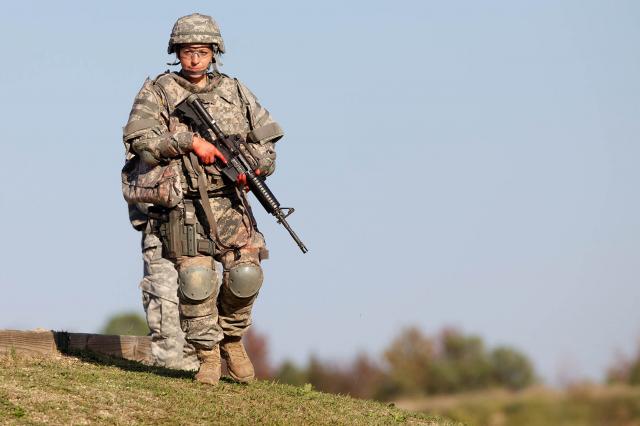A commission of current and retired officers, senior noncommissioned officers and civilians charged with evaluating Defense Department policies to ensure they promote equal opportunity plans to recommend lifting the ban on women in combat.
The nonpartisan Military Leadership Diversity Commission will make 20 recommendations to President Barack Obama and Congress to increase diversity and inclusiveness and develop “a demographically diverse leadership that reflects the forces it leads and the public it services,” according to a pre-decisional draft document posted on the commission’s website.
The final report is expected in March.
Calling the military a leader in providing opportunities to all servicemembers, regardless of their racial and ethnic background, the group concluded that it’s now time to eliminate barriers based on gender.
Current U.S. military policy prohibits women from serving in combat units below the brigade level. And although women make up 14.6 percent of the military, they and minority members still are underrepresented in leadership posts, the commission noted.
“Increasing the racial, ethnic and gender diversity of senior leadership requires eliminating barriers that disproportionately affect the advancement of women and minorities,” the draft report said.
This can be done on two levels, the commissioners said, beginning with the education and mentoring required to ensure all servicemembers are equally prepared to manage their career progression.
“Second, DoD and the services must remove institutional barriers to open traditionally closed doors, especially those related to assignments,” the draft report continues. “An important step in this direction, recommended by the commission, is to remove the restrictions that prevent women from engaging in direct ground combat.”
Retired Army Lt. Gen. Julius W. Becton, Jr., a commission member, announced last week at a military professionalism conference that the group had agreed to recommend that women be allowed to serve in combat.
“What we are saying is that women may be assigned to any job they are qualified for,” Becton said at the National Defense University’s conference on “Introspection and Reflection on Basic Tenets and the Way Ahead” on Jan. 11.
“We are making a recommendation,” he said. “We are saying, ‘Let’s remove barriers.’ And I think people are very qualified to do certain jobs, but because of their gender, they are not given the opportunity to do them.”
Becton has witnessed a sea change in equal opportunity in the military. He rose through the ranks from a private serving in a segregated Army during World War II to become commander of 7th Corps during the Cold War, and he helped to pave the way to fully integrate women into the military.
In response to a questioner, Becton said it will be up to the American people to decide if they will support seeing women in combat billets.
“It was the opinion of the 32 members of the commission — and we listened to quite a few of our women; Soldiers who have been in combat, lost limbs, helicopter pilots and everything else — that once they demonstrate what can be done, the country will go along with them,” he said. “But that is a decision the country must make.”
The Defense Department will review the commission’s recommendations when the final report is issued, Pentagon spokesman Marine Corps Col. Dave Lapan told reporters last week.
“We’ll see what the nature of the report is when it’s done,” Lapan said.
Congress repealed the combat exclusion laws in the 1994 National Defense Authorization Act, but requires the services to submit proposed changes to existing assignment policy to Congress for review, he explained.
For example, the Navy was required to inform Congress before changing its new policy to authorize women to serve on submarines, he said.










